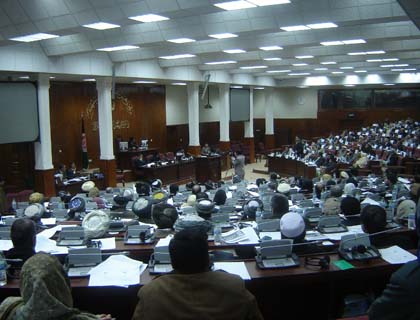KABUL - The Wolesi Jirga on Sunday criticized jails officials for involvement in moral corruption, bribery and sale of narcotics inside prisons.
The house domestic security commission summoned the director general of prisons and the Pul-i-Charkhi jail commander to answer public representatives’ questions.
A member of the commission, Attaullah, said there was no doubt about corruption in Pul-i-Charkhi prison. Jail terms of some prisoners were over but they continued to languish in prison because they could not pay bribes, he alleged.
The sale of drugs in that prison was another serious problem, he said, adding addicted inmates openly purchased narcotics from guards.
Another member, Nazifa, said some prisoners had become drug addicts and others were sexually abused.
Director General of Prisons Abdul Alim Kohistani confirmed the problems, saying that was why the department’s control had been shifted from the Ministry of Justice to the Ministry of Interior.
He acknowledged basic human rights were violated in some prisons, as 200 inmates were kept in a room that had capacity for only 50 inmates.
There is no proper prison in 12 provinces and inmates there were held in rented houses, according to Kohistani, who promised all possible measures to solve the problems.
But Pul-i-Charkhi Prison head, Maj. Gen. Sardar Mohammad Sultani, rejected the claims of lawmakers. He insisted no inmate was being held despite serving his prison term.
There were drug addicts in the prison, but their number was not as high as claimed by public representatives, he said. A rehabilitation centre for addicts had been created in the prison, he said, announcing the sacking of 13 officers involved in selling drugs.
He explained Pul-i-Charkhi guards were not allowed to search women inmates because female guards were there to do so. He denied moral corruption in the prison because inmates aged 20 to 25 were kept in separate rooms. (Pajhwok)

